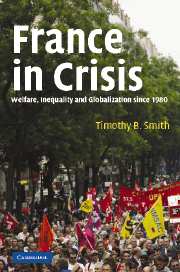Book contents
- Frontmatter
- Contents
- List of tables
- Preface
- 1 The misunderstood French welfare state
- 2 Corporatist welfare states: the residue of the past, or the wave of the future?
- 3 The “treason of the intellectuals”: globalization as the big excuse for France's economic and social problems
- 4 France's break with socialism
- 5 Persisting inequalities
- 6 The protected people
- 7 The excluded: immigrants, youth, women
- 8 The French exception
- Appendix: Some major pieces of social legislation, France 1893–2003
- Notes
- Index
8 - The French exception
Published online by Cambridge University Press: 12 January 2010
- Frontmatter
- Contents
- List of tables
- Preface
- 1 The misunderstood French welfare state
- 2 Corporatist welfare states: the residue of the past, or the wave of the future?
- 3 The “treason of the intellectuals”: globalization as the big excuse for France's economic and social problems
- 4 France's break with socialism
- 5 Persisting inequalities
- 6 The protected people
- 7 The excluded: immigrants, youth, women
- 8 The French exception
- Appendix: Some major pieces of social legislation, France 1893–2003
- Notes
- Index
Summary
During the last fifty years, our social welfare institutions have developed with a complete disregard for the principle of reality which governs all human activity: the recognition of limits and the constraints imposed by a finite universe.
Sociologist Michel Crozier, in his Etat moderne, Etat modeste (1987).The future of Social Security is largely dependent on the prevailing psychological climate. In this respect, two opposing and contradictory elements can be identified: on the one hand, the French are strongly attached to the institution; on the other, they are not sufficiently aware of the responsibility they have towards [paying for] it.
Pierre Laroque, one of the “founding fathers” of the post-Second World War welfare state, 1985.Faithful to its [sense of being an] exception, France thought it could maintain public spending and salaries, reduce the working week, without touching social benefits either.
Michel Godet, referring to the Jospin years, in Claude Bébéar, ed., Le Courage de réformer (2002).In 1998, Martine Aubry succeeded in convincing her party to pass the 35-hour law, also known as the Loi Aubry or the RTT (Réduction du Temps de Travail). The law was phased in during 2000 to 2002. The Loi Aubry was grounded in the idea that work is a finite thing and that it must be regulated and “shared” in order to reduce unemployment, but that wages need not be reduced.
- Type
- Chapter
- Information
- France in CrisisWelfare, Inequality, and Globalization since 1980, pp. 212 - 223Publisher: Cambridge University PressPrint publication year: 2004

